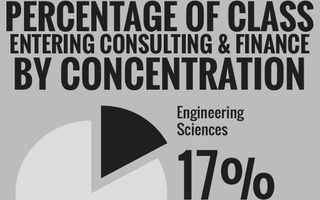Undergraduate Council representatives raised concerns with the current state of UC finances at Sunday’s general meeting.
Many of these concerns addressed the tight UC budget, which has severely hindered the Council’s ability to provide full funding for many student organizations. Though the budget has remained relatively constant over the past few years, the number of student organizations requesting grants funding each year has increased.
At the meeting, the Council unanimously voted to provide more than $32,000 in funding—approved at last Wednesday’s Finance Committee meeting—to various club sports groups on campus. The amount was about the same as previous funding levels for those student groups.
However, as Finance Committee chair Matthew R. Marotta ’14 noted in the legislation, this was 54 percent less than the amount of funding the Finance Committee would have provided to club sports groups had the Council not been facing a budget constraint.
“This [was] by far the most painful meeting I’ve ever been in on the UC,” Marotta said in his presentation to the Council, referring to last Wednesday’s Finance Committee meeting. “When we whittled the numbers down … that’s [money] all of these clubs could have used.”
The Council discussed various methods to address the issue of student group funding, including an additional push for the administration to increase the $75 term-bill fee paid by all Harvard students, which serves as the Council’s greatest funding source.
“Recently we heard from the [Office of Student Life] that [the term-bill increase] is not happening and is under review,” UC President Tara Raghuveer ’14 said at the meeting. “At this point, we are feeling the cuts every week … and also, more importantly, [it is] not good for student groups if they’re consistently not getting the funding that they need.”
Representatives plan on soliciting feedback from campus organizations regarding how grant funding cuts would affect their activities. They plan to compile these accounts in a report that they will eventually present to administrators to strengthen their case for an increase in student group funding.
The Council also discussed the revised campaign spending limit for UC presidential elections made by the UC Election Commission.
According to the new rules, the Council will allocate a maximum total of $900 for campaign reimbursements, with each campaign subjected to a spending limit of between $150 and $250 for campaign materials. These rules significantly reduce the spending limit from last year, when each campaign was allowed to spend up to $400 on campaign materials.
Rules Committee chair Kevin H. Xiong ’17 said that the change was made not only to conserve money in the UC budget but also because presidential and vice presidential candidates typically have not reached the previous spending limit.
—Staff writer Steven S. Lee can be reached at steven.lee@thecrimson.com Follow him on Twitter at @StevenSJLee.
Read more in News
Chicago Mayor Discusses Improvements in Economy, EducationRecommended Articles
-
An Arms RaceThe Brown-Warren race demonstrates the absurdity of our current campaign-finance system.
-
Our Democracy Is Broken, But We Can Fix ItIndeed, in the wake of Citizens United and years of weak campaign finance laws, there is a lot we do not know about how our elected officials reached our TVs, our YouTube videos, and our ballots in the endless campaign leading up to Tuesday, November 6
-
Bonfire of the VanitasBut, I feel I finally need to draw the line with one specific aspect about Harvard’s finance culture: the pervasive atmosphere around campus that upon graduation, banking and consulting are the only “real jobs” and everything else is a failure.
-
The Legacy of the Super ColliderTwenty years ago, on October 19, 1993, the US House of Representatives voted 264 to 159 to reject further financing for the Superconducting Super Collider, the particle accelerator being built under Texas.
-
 Pursuing Passion? Selling Out? Buying Time?
Pursuing Passion? Selling Out? Buying Time? -
Thank You, OCSWe applaud OCS for its success at linking students to these specific career opportunities. The primary concern of most upperclassmen here is securing employment post-graduation, and it is impressive that 18 to 22 percent of the student body manage to consistently land jobs in consulting and finance.













